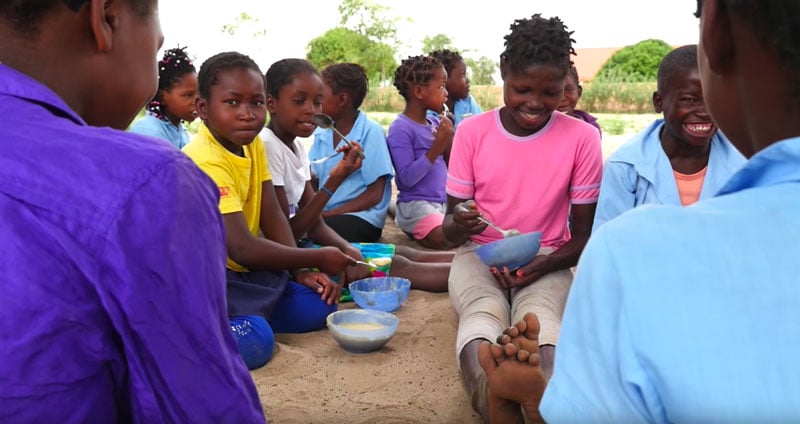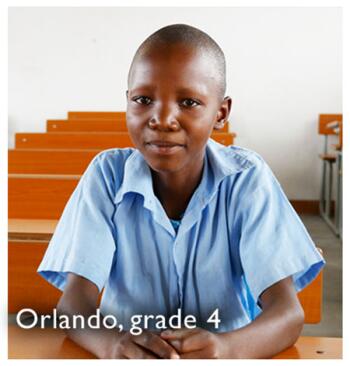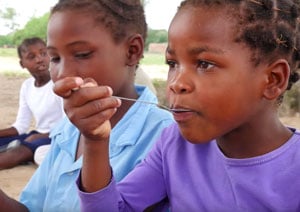Planet Aid Celebrates International Day of the African Child

The Day of the African Child has been commemorated every year on June 16 since its inception in 1991. It serves as a global reminder for communities, governments, and organizations to continue working towards improving the wellbeing of children throughout the continent.
There are 247 million children in Sub-Saharan Africa that are deprived of basic human rights like water, education, health, or shelter. Encouragingly, significant progress continues to be made in these arenas, especially in education—the proportion of children enrolled in primary or secondary school has increased by 54 percent since 1990, more than any other developing region.
To celebrate the successes achieved thus far, Planet Aid shares the story of just one of the thousands of African children that has benefitted from our sustainable development projects.
 Orlando is a soft-spoken 4th grader who lives in the Maputo Province of Mozambique. He enjoys school and especially loves studying mathematics. He hopes to become excellent at math so that he can be a teacher himself someday.
Orlando is a soft-spoken 4th grader who lives in the Maputo Province of Mozambique. He enjoys school and especially loves studying mathematics. He hopes to become excellent at math so that he can be a teacher himself someday.
Though Orlando is making good progress academically, he wasn't always the energetic student he is now.
"Orlando sometimes wouldn't come to school", said Ilda Ismael Chicuanba, Orlando's teacher at Pfungurene Primary School. "We would have to keep up after him and in the classroom he would not be very involved."
Pfungurene Primary School is located 90 kilometers from Maputo. Many of the women grow food while the men have mostly emigrated in search of work.
When the Food for Knowledge Project was launched at his school in 2012, Orlando began receiving a daily porridge meal, made of a protein-rich corn-soy blend. "Now, with the meals, he has the desire to come to school," said Ilda. "Now, he even helps other children in the classroom."
Orlando himself says he is less tired in class because of the daily meal. The food gives him energy to play soccer with his friends and keep up with his studies.
Orlando is one of the thousands of children in Mozambique who are benefitting from this program funded by USDA's McGovern-Dole International Food for Education and Child Nutrition program and implemented by Planet Aid. The project has already provided more than 12 million meals to students, and will ultimately help more than 80,000 children by the end of 2020.
The headmaster of Orlando's school, Sonia Carlota Damião, emphasizes that the project has had a positive effect on the entire school. "The students don't fall behind anymore, they don't drop out, they go to school very regularly, and they have more energy," she says. An additional 30 students have enrolled since the program started. Similar increases have occurred at other Food for Knowledge schools.
 While the meals have had tremendous impact, they are not enough to address the multiple challenges faced by school children in Mozambique. That is why Food for Knowledge is doing more than providing school meals. This unique and holistic program is addressing nutrition and education needs by training more than 7,000 teachers, while also educating communities about proper nutrition, enhancing infrastructure, establishing school gardens and literacy clubs, and building local capacity so that the impacts are sustainable beyond the project timeline.
While the meals have had tremendous impact, they are not enough to address the multiple challenges faced by school children in Mozambique. That is why Food for Knowledge is doing more than providing school meals. This unique and holistic program is addressing nutrition and education needs by training more than 7,000 teachers, while also educating communities about proper nutrition, enhancing infrastructure, establishing school gardens and literacy clubs, and building local capacity so that the impacts are sustainable beyond the project timeline.
At Orlando's school, for example, a new kitchen and new latrines were built by the project, and there is now a tap available for clean water. Teachers also received training in nutrition essentials, hygiene, and how to organize clubs and special events to promote literacy.
Because of Food for Knowledge, students like Orlando have the chance to get a healthier start on life.
Click below to learn more about the programs the Planet Aid supports:
- Child Aid Belize, Botswana, DR Congo, Ecuador, Laos, Malawi, South Africa, and Zimbabwe.
- Preschools and Step-Up Centers South Africa, Mozambique, and India
And click here to find a bin to donate your clothes and shoes.
